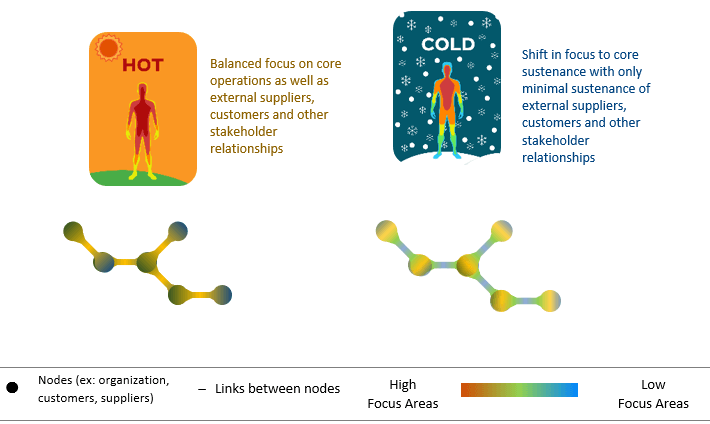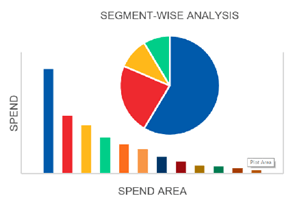With the current situation fuelling the need for an effective solution to combat the pandemic, it is imperative to understand how technology can be a catalyst during these unprecedented times. But to understand the best possible technology approach, it might be a good idea to learn from areas outside business. For instance, interesting insights can be drawn from how, we as human beings, have biologically evolved and survived numerous challenges and crises to arrive at the point we are right now.
Understanding the Biology of Supply Chains in tandem with Digital’s Unique Positioning
In an increasingly turbulent environment, supply chain behavior has begun to mimic that of the human body in colder climates. Drawing parallels here, companies have begun to take on the behavior of vital organs, drawing blood flow away from the extremities of the supply chain to focus on sustaining their core functioning.
In today’s environment of physical distancing, communication has become the blood-equivalent of supply chain temperature control, with Digital and IT playing an arterial role to ensure supply chain sustainability.

What can we learn from nature’s way of adapting to unfavorable colder climates? Let’s look at some ‘human biology – supply chain’ analogies to understand what we can glean and apply to our management of the digital supply chain:
-
1. Preserving energy and resources:
-
a. Conserving energy through insulation

Humans have adapted to living in cold climates and avoiding hypothermia primarily by using technology, in the sense of insulated clothing and shelter. These have served us by conserving energy and preventing heat loss. -
b. Insulating and Re-prioritizing Supply Chain Areas

An increased focus and consolidation of core expenses, with a reduction of tail spend and fringe expense areas can help conserve resources while maintaining stability.
Further, a renewed focus on organizational principles and core values based on the organization’s founding principles, as is being observed, can provide a strong sense of strategic direction. -
c. Leveraging Digital

Data analytics targeted at spend and customer consolidation can greatly aid companies in fine tuning their supply chain. This could include exploratory analysis, what-if scenario analysis as well as developing models and dashboards to obtain continuous feedback on the health of the organization’s supply chain.
-
-
2. Leveraging challenges as a springboard for growth:
-
a. Growing to survive

In line with Bergmann’s rule of eco-geography, most endothermic (thermally self-regulating) animal subspecies living in colder climates have larger bodies than those living in warmer climates. Larger bodies produce more heat due to having more cells and have a smaller surface area to volume ratio, which reduces heat loss.
There also occurs an increase in metabolic rate and shivering, to produce a larger amount of heat in order to maintain body temperature. -
b. Building Supply Chain Resilience through Continual Strategic Growth

Organizational size and highly robust supply chains are important factors to ensure long-term sustainability. A strong supply chain may be characterized by:
• Continual focus on growth in terms of developing new products and services
• Continual search for new opportunities related to existing products, even during turbulent times
• Growth in capabilities through employee retention, learning and development initiatives
• Supply assurance via diversification across multiple suppliers -
c. Leveraging Digital

Applying supply chain AI/ ML solutions customized to one’s industry and the current environment can help support growth via accurate demand planning and forecasting, identification of optimal supply sources, and intelligent materials planning and routing.
Growing internal skillsets and talent pool via online training portals, learning and development programs as well as utilizing AR/ VR solutions for complex training involving physical assets can help grow an organization’s skill base
-
-
3. Staying efficient and connected:
-
a. Adapting Dimensionally

Allen’s rule (biology) observes that the limbs of endotherms (thermally self-regulating creatures) are shorter in those living in cold climates compared to endotherms in hot climates. Shorter limbs help to conserve heat due to lower surface area and a lower area-volume ratio. Marshall T. Newman observed this adaptation in Eskimos, who have shorter limbs than other people and are laterally built. -
b. Increasing physical and digital proximity of supply chain nodes

Supply chain links, akin to limbs, can become ‘shorter’ in two ways:
• By an increasing use of regional or local suppliers for physical products that may otherwise have a high Total Cost of Acquisition (TCA)
• Increasing communication and decision making by leveraging digital collaboration solutions
• Upgrading physical and digital infrastructure to handle higher traffic speed -
c. Leveraging Digital

As outlined earlier, digital has begun to play an arterial role in keeping the supply chain connected and in transcending physical distances. What is needed today is leveraging the power of digital in increasing collaboration among internal and external stakeholders. This could be through tools such as Office 365 for employee collaboration or through leveraging ERP to stay digitally, if not physically proximate with your suppliers and customers in real time.
-
Nature, not very unlike business, has embraced many counter-intuitive approaches to ensured continued progressive growth. Bringing our analogical reasoning to a close, it might be useful for us to observe that sometimes, supply chain challenges and business disruptions that arise out of biology, might find their solutions in that very science.



















